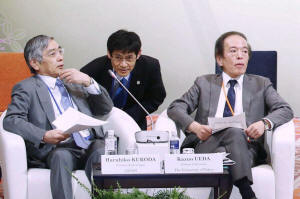Japan set to pick academic Ueda as next Bank of Japan chief -sources
 Send a link to a friend
Send a link to a friend
 [February 10, 2023] By
Takaya Yamaguchi, Kentaro Sugiyama and Yoshifumi Takemoto [February 10, 2023] By
Takaya Yamaguchi, Kentaro Sugiyama and Yoshifumi Takemoto
Tokyo (Reuters) - Japan's government is likely to appoint academic Kazuo
Ueda as the next Bank of Japan governor, two government officials told
Reuters, a surprise choice that could see the country finally align with
other major economies in raising interest rates.
Ueda, a former BOJ policy board member and an academic at Kyoritsu
Women's University, is considered an expert on monetary policy but had
not even been seen as a dark horse candidate for the top job.
He played a key role in battling the initial phase of Japan's deflation
with the introduction of huge amounts of asset purchases and forward
guidance for financial markets.
The yen and bond yields initially rose on the news, which fuelled bets
the 71-year-old could end super-low interest rates sooner than if top
contender and dovish BOJ Deputy Governor Masayoshi Amamiya had got the
job.

The Japanese currency trimmed gains after Ueda, in comments streamed
online by Nippon TV, said it was appropriate for the BOJ to maintain its
current ultra-easy policy. He said nothing had been decided about his
nomination.
Investors have repeatedly tried to push up Japanese government bond
yields in recent months on expectations the BOJ will start to gradually
phase out its massive stimulus programme when a new governor takes over
from Haruhiko Kuroda, whose second term ends in April.
Years of heavy BOJ bond buying have increasingly distorted the country's
bond markets and many market watchers had thought further tweaks in
policy were inevitable.
"Kuroda's policies will be modified and monetary policy will head toward
normalisation. But any step will be taken cautiously to avoid any
adverse effect on markets and financial institutions," said former BOJ
board member Takahide Kiuchi.
BOJ watchers and people who worked with Ueda describe him as a
pragmatist who is neither an explicit hawk nor a dove and is
well-respected within the central bank.
"Ueda won't make any abrupt, hasty moves toward policy normalisation.
But he won't leave the side-effects of the BOJ's policy, such as
dysfunctions seen in the bond market, unattended," said Nobuyasu Atago,
a former BOJ official who has worked with Ueda.
"I expect the BOJ to gradually phase out YCC this year," he said,
referring to the bank's bond yield curve control policy aimed at
suppressing short- to medium-term bond yields without depressing
super-long yields too much.
BOJ STICKS TO LOOSE POLICY
While central banks around the world have been scrambling to cool
stubbornly high inflation with rate hikes, the BOJ has been in no rush
to change its super-loose policy stance on the view that wage hikes must
accompany recent cost-driven inflation.
Even as Japanese inflation hit 4% in December - double the BOJ's 2%
target - Kuroda has argued it is too early to tell if price rises will
be sustainable.
[to top of second column] |

Bank of Japan Governor Haruhiko Kuroda
and Kazuo Ueda, a member of the central bank's policy board, attend
a symposium ahead of G7 Finance Ministers and Central Bank
Governors' meeting in Sendai, Japan May 20, 2016, in this photo
taken by Kyodo via REUTERS

The government will also nominate Ryozo Himino, former head of
Japan's banking watchdog, and BOJ executive Shinichi Uchida as
deputy governors, the two officials with knowledge of the matter
said, speaking on condition of anonymity as they were not authorised
to speak publicly.
The Nikkei reported earlier that Ueda, Himino and Uchida will make
up the new BOJ leadership if confirmed by parliament.
Analysts expect career central banker Uchida to work closely with
Ueda, who will be the first academic to take the BOJ helm, and
assist him on the operational details of YCC.
Himino, who speaks fluent English, is likely to mainly be in charge
of international affairs, they say.
Many central bank watchers had seen Amamiya as the strongest
candidate to take the helm given his deep experience in monetary
policy, but the Nikkei reported that he had declined.
The yen strengthened after the Nikkei reported the appointments,
before trimming some of its gains. The dollar briefly fell 1.2% to
129.8 yen. It was last down 0.5% to 130.90 yen.
Japan's 10-year government bond yield hit 0.50%, the top end of the
BOJ's policy band.
Prime Minister Fumio Kishida said on Friday the government is
expected to present the nominees to parliament on Feb. 14.
"Being a theorist and practitioner at the same time would make
(Ueda) well-positioned going forward as the BOJ enters a difficult
period of (policy) normalization," said Shotaro Kugo, an economist
at Daiwa Institute of Research.
"None of the three governor/deputy governors appear to have the
(dovish) reflationist idea. I can see the government's intention to
renew the direction of monetary policy from the previous one."

In an opinion piece in the Nikkei last July, Ueda warned against
prematurely raising rates just because inflation briefly exceeded
2%.
But he also wrote that the BOJ must consider how to exit its
ultra-loose policy and review its extraordinary stimulus programme
at some point.
Ueda served on the BOJ's board from 1998 to 2005. He voted against
raising interest rates to 0.25% from zero in August 2000, arguing
that the bank could wait a while given limited inflation. The BOJ
later reversed its decision and cut rates again.
(Reporting by Tokyo newsroom, Akriti Sharma in Bengaluru; Writing by
Leika Kihara; Editing by Jacqueline Wong, Sam Holmes, Kim Coghill
and Hugh Lawson)
[© 2023 Thomson Reuters. All rights
reserved.]
This material may not be published,
broadcast, rewritten or redistributed.
Thompson Reuters is solely responsible for this content. |